
Leukemia Therapeutics Market by Type of Leukemia (Acute Lymphocytic Leukemia (ALL), Acute Myeloid Leukemia (AML), Chronic Lymphocytic Leukemia (CLL), Chronic Myeloid Leukemia (CML), and Others), by Treatment Type (Chemotherapy, and Targeted Therapy), by Route of Administration (Oral Mode and Injectable Mode), and by Distribution Channel (Hospital Pharmacy, and Retail Pharmacy) – Global Opportunity Analysis and Industry Forecast, 2024–2030
US Tariff Impact on Leukemia Therapeutics Market
Trump Tariffs Are Reshaping Global Business
Market Definition
The global Leukemia Therapeutics Market size was valued at USD 17.34 billion in 2023, and is predicted to reach USD 29.05 billion by 2030, with a CAGR of 9.0% from 2024 to 2030. Leukemia, also known as blood cancer impacts the blood and bone marrow. It primarily involves the uncontrolled growth of abnormal white blood cells that are in charge for fighting contaminations in the body.
Leukemia therapy uses chemotherapy, radiation therapy, targeted therapies, immunotherapy, and bone marrow transplantation to control and manage blood cancer. The treatment depends on the leukemia type, stage, and the patient's health. Leukemia therapies aim to control abnormal blood cell growth, relieve symptoms, and enhance the patient's well-being. There is a growth in the count of the disease involving the widespread therapeutics involved in curing the disease.
Market Dynamics and Trends
The leukemia therapeutics market is significantly growing due to the development of breakthrough treatments such as bone marrow transplants and menine inhibition applied in the field of cancer therapeutics. Such treatments offer positive and improved patient outcomes and the potential to benefit the healthcare industry, further contributing to the market growth. For instance, in December 2022, the U.S. Food and Drug Administration (FDA) approved Revumenib, a novel targeted therapy designed for advanced Acute Myeloid Leukemia (AML). This treatment approach, which targets gene expression instead of proteins, provides better results and improves patient outcomes, offering newfound hope to patients with advanced AML.
Moreover, the growth in the elderly population worldwide, who are more prone to chronic conditions, including leukemia, is leading to a surge in government funding for clinical trials and advancements in cancer therapies. This, in turn, boosts the growth of the market. For instance, in January 2023, the New South Wales (NSW) Government invested USD 3.75 million in a clinical trial aimed at helping older individuals with AML. This trial aimed at finding new drug combinations to improve care and longevity for older individuals with AML who may not tolerate aggressive chemotherapy.
However, the high cost of treatment and lengthy and rigorous regulatory approval process for leukemia drug developments significantly restrain the leukemia therapeutics market. On the contrary, the introduction of targeted therapies such as Chimeric Antigen Receptor (CAR)-T cell therapy for treating a broader spectrum of blood cancers is anticipated to create ample opportunities for the growth of the leukemia therapeutics market in the coming years.
For instance, in August 2023, researchers at the University of Pennsylvania's Perelman School of Medicine conducted preclinical tests to expand CAR-T cell therapy use. The test aimed to treat a broader spectrum of blood cancers, advancing leukemia treatment options in the market.
Market Segmentation and Scope of Study
The leukemia therapeutics market share is divided on the basis of treatment type, type of leukemia, mode of administration, gender, and region. On the basis of type of leukemia, the market is divided into acute lymphocytic leukemia (ALL), acute myeloid leukemia (AML), chronic lymphocytic leukemia (CLL), chronic myeloid leukemia (CML), and others. Based on treatment type, the market is categorized into chemotherapy and targeted therapy.
On the basis of route of administration, the market is classified into oral mode and injectable mode. On the basis of distribution channel, the market is bifurcated into hospital pharmacy and retail pharmacy. The regional breakdown and analysis of each of the aforesaid segments includes regions, such as North America, Europe, Asia-Pacific, and the Rest of the World (RoW).
Geographical Analysis
North America holds the dominant share of the leukemia therapeutics market. The market is analyzed across the U.S., Canada, and Mexico. The growing research in regenerative medicines to treat blood cancer such as lymphoma and leukemia along with the growing awareness of cell-based therapies are boosting the growth of the market in this region. For instance, in May 2023, the U.S. Food and Drug Administration (FDA) approved Omisirge, a cell therapy derived from allogeneic cord blood. The cell therapy accelerates neutrophil recovery and reduces the infection risks in cancer patients undergoing cord blood transplantation.
Also, the rising incidence of cancer cases and concerns around subsequent death are further fuelling the growth of the leukemia therapeutics market in this region. According to the American Cancer Society, the U.S. is expected to have approximately two million new cancer cases in 2023. Among these cases, blood cancers will make up about 10%, leading to around 609,820 cancer-related deaths in the U.S. Such a rise in number is creating a surge in the need for blood cancer therapeutics.
On the other hand, the Asia-Pacific region is emerging as the fastest-growing sector in the leukemia therapeutics market, primarily driven by intensified research efforts on existing medications. For instance, in January 2023, researchers at the Cancer Science Institute, Singapore, rediscovered the drug PIK-75 as a potential treatment for T-cell acute lymphoblastic leukemia (T-ALL). The PIK-75 was identified as capable of blocking crucial cancer-causing pathways in T-ALL, providing an effective treatment option for T-ALL patients.
Moreover, increasing collaborations between hospitals and research institutes toward developing innovative blood cancer treatments such as precision medicine and immunotherapy are further driving the growth of the leukemia therapeutics market in the region. For instance, in February 2023, the Children's Cancer Institute and the Kids Cancer Centre at Sydney Children's Hospital, Randwick collaborated to provide treatments for children with blood cancer in Australia. The collaboration aimed to deliver precision medicine approaches and advanced genomic analysis to identify specific genetic irregularities in pediatric cancer cells under the Zero Childhood Cancer Precision Medicine Program.
Competitive Landscape
Various market players operating in the leukemia therapeutics industry include AbbVie, Inc., Bristol-Myers Squibb, F. Hoffmann-La Roche AG, Pfizer, Inc., Novartis AG, Sanofi S.A., Amgen, Inc., SymBio Pharmaceuticals Limited, Genmab A/S, Gilead Sciences, Inc. and others. These market players opt for various strategies, such as research and development and product launches, to maintain their dominance in the leukemia therapeutics market.
For instance, in Jan 2023, Bristol Myers Squibb developed a CAR-T cell therapy drug called Breyanzi that showed promising results in treating Chronic Lymphocytic Leukemia (CLL). This breakthrough offers hopeful treatment options for individuals dealing with CLL.
Moreover, in June 2022, Novartis launched Scemblix, a novel medication for adult patients with Chronic Myeloid Leukemia (CML), with the approval of the Committee for Medicinal Products for Human Use (CHMP). This launch opens a new solution for leukemia therapy, introducing a potential new treatment option for those impacted by CML and offering improved patient outcomes and quality of life.
Key Benefits
-
The report provides a quantitative analysis and estimations of the leukemia therapeutics market from 2024 to 2030, which assists in identifying the prevailing market opportunities.
-
The study comprises a deep-dive analysis of the current and future leukemia therapeutics market trends to depict prevalent investment pockets in the market.
-
Information related to key drivers, restraints, and opportunities and their impact on the leukemia therapeutics industry is provided in the report.
-
Competitive analysis of the key players, along with their market share is provided in the report.
-
A SWOT analysis and a Porter's Five Forces model is elaborated on in the study.
-
Value chain analysis in the market study provides a clear picture of the roles of stakeholders'.
Leukemia Therapeutics Market Key Segments
By Type of Leukemia
-
Acute Lymphocytic Leukemia (ALL)
-
Acute Myeloid Leukemia (AML)
-
Chronic Lymphocytic Leukemia (CLL)
-
Chronic Myeloid Leukemia (CML)
-
Others
By Treatment Type
-
Chemotherapy
-
Targeted Therapy
By Route of Administration
-
Oral Mode
-
Injectable Mode
By Distribution Channel
-
Hospital Pharmacy
-
Retail Pharmacy
By Region
-
North America
-
The U.S.
-
Canada
-
Mexico
-
-
Europe
-
The U.K.
-
Germany
-
France
-
Italy
-
Spain
-
Denmark
-
Netherlands
-
Finland
-
Sweden
-
Norway
-
Russia
-
Rest of Europe
-
-
Asia-Pacific
-
China
-
Japan
-
India
-
South Korea
-
Australia
-
Indonesia
-
Singapore
-
Taiwan
-
Thailand
-
Rest of Asia-Pacific
-
-
Rest of the World (RoW)
-
Latin America
-
Middle East
-
Africa
-
Key Players
-
AbbVie, Inc.
-
Bristol-Myers Squibb Company
-
F. Hoffmann-La Roche AG
-
Pfizer, Inc.
-
Novartis AG
-
Sanofi S.A.
-
Amgen, Inc.
-
SymBio Pharmaceuticals Limited
-
Genmab A/S
-
Gilead Sciences, Inc.
REPORT SCOPE AND SEGMENTATION:
|
Parameters |
Details |
|
Market Size in 2023 |
USD 17.34 Billion |
|
Revenue Forecast in 2030 |
USD 29.05 Billion |
|
Growth Rate |
CAGR of 9.0% from 2024 to 2030 |
|
Analysis Period |
2023–2030 |
|
Base Year Considered |
2023 |
|
Forecast Period |
2024–2030 |
|
Market Size Estimation |
Billion (USD) |
|
Growth Factors |
Development in breakthrough treatment in field of cancer therapeutics. Growing elderly population suffering from some form of leukemia. Active fundings from government supporting trails and innovation. |
|
Countries Covered |
28 |
|
Companies Profiled |
10 |
|
Market Share |
Available for 10 companies |
|
Customization Scope |
Free customization (equivalent to up to 80 working hours of analysts) after purchase. Addition or alteration to country, regional, and segment scope. |
|
Pricing and Purchase Options |
Avail customized purchase options to meet your exact research needs. |

















 Speak to Our Analyst
Speak to Our Analyst




















